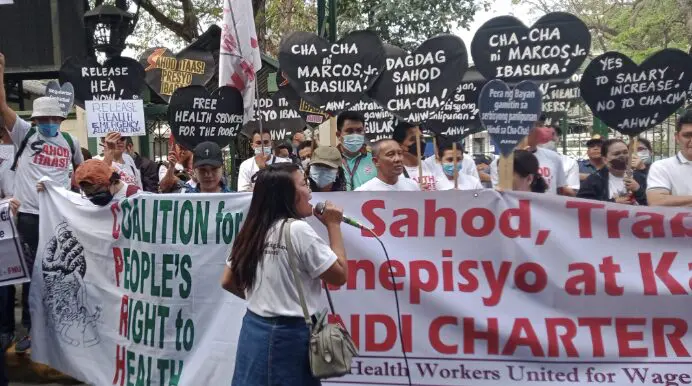Filipino health workers stand up against state repression
Health workers in the Philippines are fighting for a just healthcare system while facing state repression, highlights a recent discussion by Viva Salud, Quinoa, and ICHRP.
This article was published on september 20th, in People’s Dispatch
Aux Philippines, les intérêts privés surplombent les besoins publics
Healthcare workers in the Philippines are advocating for a just healthcare system amidst systemic neglect and privatization, while defending their democratic rights against state repression at the same time. A recent webinar organized by Viva Salud, Quinoa, and the International Coalition for Human Rights in the Philippines (ICHRP) highlighted some of the problems they face every day.
Kat Berza, director of the advocacy and research department of the Council for Health and Development (CHD) highlighted That despite the nation’s natural resources, 46% of families are impoverished, and healthcare remains largely inaccessible. In 2022, out-of-pocket healthcare expenses comprised 44.7% of total spending, with average hospital bills reaching Php 46,640 (approximately USD 838)—about three months of minimum wage. This, Berza said, reflects a fundamental failure by the government to uphold the right to health.
Privatization has worsened the situation, with 66.4% of hospitals being privately owned by 2020. Private facilities often require fees beyond the reach of most Filipinos. Public-private partnerships, pushed by President Marcos Jr., are driving commodification of healthcare further, serving private interests over public needs. With only 5% of the national budget allocated to health, the government’s commitment to providing equitable healthcare is lacking to say the least.
Healthcare workers are battling not only for an accessible health system but also for their labor rights. They operate in underfunded, understaffed facilities with salaries as low as Php 13,000 (USD 233)—well below the living wage of Php 36,480 (USD 655). In addition to poor working conditions, these workers face state repression for their activism.
Activists in the Philippines are often “red-tagged,” or labeled as terrorists or insurgents for pushing for systemic changes. This harassment is intended to silence dissent, leaving healthcare workers exposed to surveillance, arrest, and, many times, even violence.
Dr. Oliver Gimenez, known as Dr. Ogie, is a blatant example of the severe risks faced by community doctors in the Philippines. As a health worker with the Visayas Primary Healthcare Services (VPHCS), Dr. Gimenez trained community health workers from various backgrounds, addressing the gaps left by government neglect.
His commitment extended beyond medical care to tackling the root causes of social injustice. Working with the Community Empowerment and Resource Network (CERNET), he aimed to address the systemic issues contributing to poverty. However, in May, CERNET was accused of financing terrorism under the Anti-Terror Law—a law increasingly used to suppress opposition to state policies. This false accusation led to frozen bank accounts for CERNET and its partners, crippling their ability to reach marginalized communities.
This repression of grassroots organizations like CERNET is a deliberate attempt to create a climate of fear, violating both national and international human rights standards and depriving impoverished communities of crucial support.
Pushing for systemic change
The resistance of healthcare workers and rights-based organizations in the Philippines is a testament to the ongoing struggle for systemic change globally. CHD and other groups are building alternative health systems through community-based programs, with over 70 initiatives training more than 10,000 community health workers. These programs not only address immediate health needs but also empower communities to challenge systemic inequities.
Their fight is not just about improving healthcare but about demanding a fundamental overhaul of a system that prioritizes profit over people. People’s advocates like Dr. Gimenez demonstrate the critical role of healthcare workers in pushing for broader social justice.
People’s Health Dispatch is a fortnightly bulletin published by thePeople’s Health Movement and Peoples Dispatch. For more articles and subscription to People’s Health Dispatch, clickhere.
Matilde De Cooman works at Viva Salud on the right to health and international solidarity. She is also an activist for Palestine and women’s rights.


